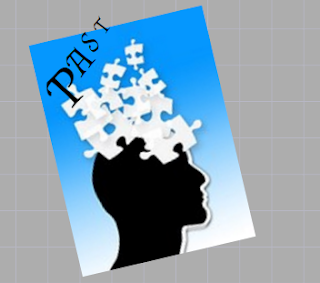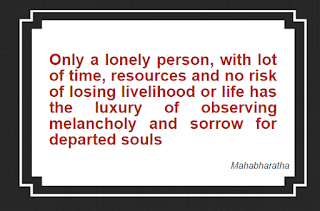Recipe to forget the past
It sounds non-sense but
it is true. Most of the time we live in the past. Our brain tricks us in such a
manner that we fail to notice that it is of no use to live in the past. However
by knowing this secret of human behavioral pattern, we can convert this seemingly
problematic condition into our advantage.
 A story from
Mahabharatha throws more
light on this. Even after the war was over, king Yudhishtira was not in a mood to perform his duties. He was always disinterested in running
his kingdom and instead he spent most of his time brooding upon the past and
kept on thinking the amount of loss incurred because of war.
A story from
Mahabharatha throws more
light on this. Even after the war was over, king Yudhishtira was not in a mood to perform his duties. He was always disinterested in running
his kingdom and instead he spent most of his time brooding upon the past and
kept on thinking the amount of loss incurred because of war.
Noticing this,
Krishna with help of Bhishma convinced Yudhishtira to perform a get-together function and invite the near
and dear ones for the event. Soon after the event was conducted, a change was
seen in Yudhishtira. He was now more involved in the happenings of kingdom and
was eager to deliver his duties as a king.
A few days later when
he happened to meet Bhishma, the latter explained him this secret knowledge. He
mentioned that even though the real war was over within 18 days, Yudhishtira's mind was
continuing to play it.
This is the way our mind functions. It has a habit of
keeping alive the memory of latest event that has happened. This will last
until another event has an impact on our memory.
When that happens the old memory will be suppressed by the more recent
one. If the recent one is a good event, the person will be in high spirits. As there is no certainty about the good event
that is yet to take place, it is all the more reason for a person to “create”
this event that will benefit him.
 By planning any such occasion which focuses your
energy in making it successful, you will automatically suppress the bad memories.
By planning any such occasion which focuses your
energy in making it successful, you will automatically suppress the bad memories.
This takes us away from the path of inaction towards an enthusiastic mindset
which craves for strength to perform a good deed. This is definitely the right
approach to bring ourselves back on track especially after suffering from a bad
situation.
Criticism – Get into the other’s shoes first
We face situations in
life where the behavior of others take us by surprise. At times it may look
very obvious and in some other occasions the moves of a person would leave us
bewildered. And there is one thing that will definitely follow – criticism.
Most often this criticism will not be positive in nature and not constructive.
Only the wearer of the
shoe knows where it pinches is a saying in English which makes us ponder over
this point. It is easy to criticize others and knowing well that they will not
revolt will only add fuel to the fire.
But how justified we are if such an
action is performed without identifying ourselves in the situation which the
other person is into? Does it not become a prerequisite to find out what the
person has been through?
 Yes, it definitely is an obligation on the part of an
observer before a meaningful delivery of words. If it doesn’t happen, the words
spoke will only be meant to cause a conscious damage to the person at the receiving
end.
Yes, it definitely is an obligation on the part of an
observer before a meaningful delivery of words. If it doesn’t happen, the words
spoke will only be meant to cause a conscious damage to the person at the receiving
end.
Whenever we face such a situation again, let us
resolve to get into the right frame of mind. Before we utter any word against
or for a person involved in the situation, let us walk a mile in the other
person’s shoes.
Let us understand the environment the person is in and what
phase he is going through and ask ourselves a question – what would I have done
if I were in his position? The reflections upon the answer to this question
would then lead to a meaningful conversation and constructive criticism when
necessary.
Acknowledging the worthy in life
 Life teaches us many lessons. It can be
likened to a web that surrounds us posing as a network of strands. It contains
various things that stick to the individual strands. There are times when the
strand is strong enough to hold on to what falls on its way.
Life teaches us many lessons. It can be
likened to a web that surrounds us posing as a network of strands. It contains
various things that stick to the individual strands. There are times when the
strand is strong enough to hold on to what falls on its way.
Sometimes a heavy
object comes through and the strand would break. At that time, we are
enlightened and to our astonishment the situation was created by the absence of
strand and not the presence of it.
It turns out that in our life we turn a
blind eye towards things that we take for granted. We do not realize their
usefulness, potential, benefit until a point in time when we do not have them
anymore.
Thus it is rightly said “When the well’s dry, we know the worth of
water”. We are so entangled within our daily chores, gossiping, warmongering,
preaching others how to lead their lives and other exciting things that we lose
sight of what is relevant to ourselves. We fail to notice that which is
important to us, our own self.
And life’s learning doesn’t always
occur in calm waters. It hits us hard when we stand in the timeline and look
back upon our deeds. The harsh reality dawns upon us then but it would be too
late.
 We would be embarrassed to recognize the exploitation done, misery
caused, downfall bestowed upon ourselves as a result of our own actions. Before
the situation goes out of hand, let us learn to realize the worth of our dear
ones – animate or inanimate, appreciate their existence and reciprocate our
goodwill.
We would be embarrassed to recognize the exploitation done, misery
caused, downfall bestowed upon ourselves as a result of our own actions. Before
the situation goes out of hand, let us learn to realize the worth of our dear
ones – animate or inanimate, appreciate their existence and reciprocate our
goodwill.
Subscribe to:
Comments (Atom)














